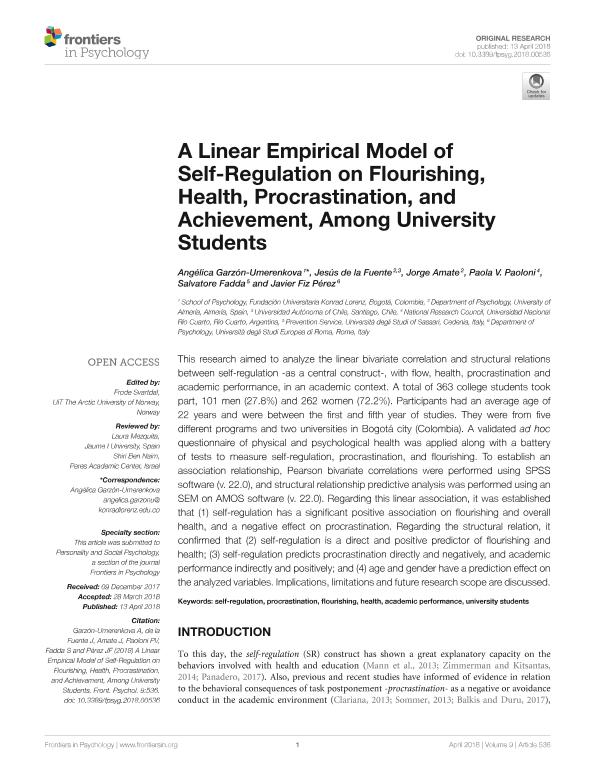Mostrar el registro sencillo del ítem
dc.contributor.author
Garzón Umerenkova, Angélica
dc.contributor.author
de la Fuente, Jesús
dc.contributor.author
Amate, Jorge
dc.contributor.author
Paoloni, Paola Veronica Rita

dc.contributor.author
Fadda, Salvatore
dc.contributor.author
Fiz Pérez, Javier
dc.date.available
2021-06-10T18:58:21Z
dc.date.issued
2018-04-13
dc.identifier.citation
Garzón Umerenkova, Angélica; de la Fuente, Jesús; Amate, Jorge; Paoloni, Paola Veronica Rita; Fadda, Salvatore; et al.; A linear empirical model of self-regulation on flourishing, health, procrastination, and achievement, among university students; Frontiers Media S.A.; Frontiers in Psychology; 9; 536; 13-4-2018; 1-12
dc.identifier.uri
http://hdl.handle.net/11336/133648
dc.description.abstract
This research aimed to analyze the linear bivariate correlation and structural relations between self-regulation -as a central construct-, with flow, health, procrastination and academic performance, in an academic context. A total of 363 college students took part, 101 men (27.8%) and 262 women (72.2%). Participants had an average age of 22 years and were between the first and fifth year of studies. They were from five different programs and two universities in Bogotá city (Colombia). A validated ad hoc questionnaire of physical and psychological health was applied along with a battery of tests to measure self-regulation, procrastination, and flourishing. To establish an association relationship, Pearson bivariate correlations were performed using SPSS software (v. 22.0), and structural relationship predictive analysis was performed using an SEM on AMOS software (v. 22.0). Regarding this linear association, it was established that (1) self-regulation has a significant positive association on flourishing and overall health, and a negative effect on procrastination. Regarding the structural relation, it confirmed that (2) self-regulation is a direct and positive predictor of flourishing and health; (3) self-regulation predicts procrastination directly and negatively, and academic performance indirectly and positively; and (4) age and gender have a prediction effect on the analyzed variables. Implications, limitations and future research scope are discussed.
dc.format
application/pdf
dc.language.iso
eng
dc.publisher
Frontiers Media S.A.

dc.rights
info:eu-repo/semantics/openAccess
dc.rights.uri
https://creativecommons.org/licenses/by/2.5/ar/
dc.subject
ACADEMIC PERFORMANCE
dc.subject
FLOURISHING
dc.subject
HEALTH
dc.subject
PROCRASTINATION
dc.subject
SELF-REGULATION
dc.subject
UNIVERSITY STUDENTS
dc.subject.classification
Otras Psicología

dc.subject.classification
Psicología

dc.subject.classification
CIENCIAS SOCIALES

dc.subject.classification
Otras Ciencias de la Educación

dc.subject.classification
Ciencias de la Educación

dc.subject.classification
CIENCIAS SOCIALES

dc.title
A linear empirical model of self-regulation on flourishing, health, procrastination, and achievement, among university students
dc.type
info:eu-repo/semantics/article
dc.type
info:ar-repo/semantics/artículo
dc.type
info:eu-repo/semantics/publishedVersion
dc.date.updated
2021-06-07T15:31:06Z
dc.identifier.eissn
1664-1078
dc.journal.volume
9
dc.journal.number
536
dc.journal.pagination
1-12
dc.journal.pais
Suiza

dc.journal.ciudad
Lausanne
dc.description.fil
Fil: Garzón Umerenkova, Angélica. Fundacion Universitaria Konrad Lorenz. Facultad de Psicologia.; Colombia
dc.description.fil
Fil: de la Fuente, Jesús. Universidad de Almería; España. Universidad Autónoma de Chile; Chile
dc.description.fil
Fil: Amate, Jorge. Universidad de Almería; España
dc.description.fil
Fil: Paoloni, Paola Veronica Rita. Universidad Nacional de Río Cuarto; Argentina. Consejo Nacional de Investigaciones Científicas y Técnicas. Centro Científico Tecnológico Conicet - Córdoba; Argentina
dc.description.fil
Fil: Fadda, Salvatore. Università degli Studi of Sassar. Prevention Service; Italia
dc.description.fil
Fil: Fiz Pérez, Javier. Università degli Studi di Roma "La Sapienza"; Italia
dc.journal.title
Frontiers in Psychology
dc.relation.alternativeid
info:eu-repo/semantics/altIdentifier/doi/http://dx.doi.org/10.3389/fpsyg.2018.00536
dc.relation.alternativeid
info:eu-repo/semantics/altIdentifier/url/https://www.frontiersin.org/articles/10.3389/fpsyg.2018.00536/full
Archivos asociados
